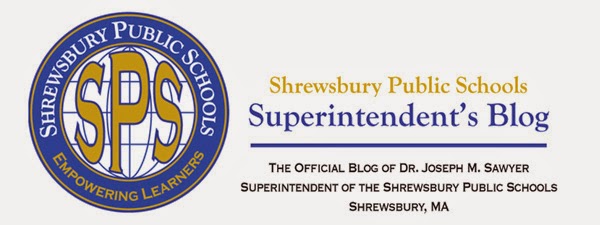This post was published as the "Superintendent's Corner" column in the Fall 2017 edition of the Shrewsbury School Journal.
Embedded within our school district’s mission is the idea that our students will appreciate and sustain our democratic tradition by becoming citizens who make positive contributions to their communities, to society, and to the world.
Embedded within our school district’s mission is the idea that our students will appreciate and sustain our democratic tradition by becoming citizens who make positive contributions to their communities, to society, and to the world.
The creation of an educated citizenry in order to ensure that democracy is sustained has historically been the aim of public education, going back to our nation’s founding. Thomas Jefferson argued that educating the general public was the greatest foundation for the “preservation of freedom and happiness” and the surest way to guard against misgovernment, which thrives on the ignorance of the people. John Adams, in the Massachusetts Constitution, enshrined the right to public education in our Commonwealth, asserting that “wisdom, and knowledge, as well as virtue” are “necessary for the preservation of (the people’s) rights and liberties.”
Many argue that American education’s overemphasis on measuring the quality of education through test scores, particularly in English and math, has created a more limited view of what our schools should be providing to our students, and is often focused on what will be necessary for future gainful employment. While developing students’ skills and knowledge is central to our work, and the economic benefits of a strong education to both individuals and society are well known, these are not sufficient for sustaining democracy. Further, the development of positive character traits in our students, while important and desirable, is also not enough. As author Joel Westheimer points out, socializing children to be respectful, honest, helpful, hardworking, kind, and collaborative is appreciated in our culture, but so would it be in virtually any society, including those governed as totalitarian dictatorships or by other non-democratic means.
So, if we are to educate our community’s youth to be good citizens in a democracy, what does that require? Westheimer suggests, and I agree, that this involves teaching students to think critically by learning how to ask questions about why things are the way they are; to seek and consider multiple perspectives and sources of information on controversial issues; and to engage in the study of what is happening now in our community, state, nation, and world.
This kind of learning requires the development of empathy, the willingness to imagine what it is like to be in other people’s shoes and to consider their points of view. Given the echo chamber that exists in today’s news media and social media environments, and the coarsening of public discourse that has emerged, it is important to help our students recognize what those who are on the other side of a controversial issue believe and why, and to recognize that while it may be uncomfortable to have one’s own assumptions challenged, that is the path to better understanding.
A crucial ingredient in this work is teaching our students how to respectfully disagree while being open to the possibility of being wrong. As Princeton University’s president, Christopher Eisgruber, wrote: “Some people mistakenly think the art of disagreement is mainly about winning debates or being able to say, ‘I was right.’ It is much harder than that. The art of disagreement is not only about confrontation, but also about learning. It requires that we defend our views, as we do in debate, and, at the same time, consider whether our views might be mistaken.”
For our students to be engaged citizens, it will take more than just talking or tweeting about an important issue; it will require them to use what they have learned to take thoughtful action. Shrewsbury High School's mission aims "to empower students to become capable, caring, and active contributors to the world in which they live." In other words, we aspire for our graduates to use their knowledge, skills, and understanding of what is right to act in order to make a positive difference. If they do, we will have succeeded in sustaining and advancing our cherished democracy.
For our students to be engaged citizens, it will take more than just talking or tweeting about an important issue; it will require them to use what they have learned to take thoughtful action. Shrewsbury High School's mission aims "to empower students to become capable, caring, and active contributors to the world in which they live." In other words, we aspire for our graduates to use their knowledge, skills, and understanding of what is right to act in order to make a positive difference. If they do, we will have succeeded in sustaining and advancing our cherished democracy.
